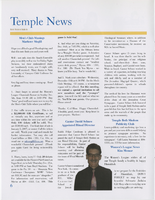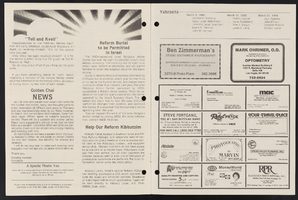Search the Special Collections and Archives Portal
Search Results
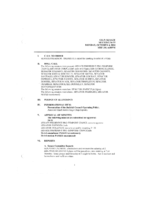
Meeting minutes for Consolidated Student Senate, University of Nevada, Las Vegas, October 04, 2004
Date
Archival Collection
Description
Text
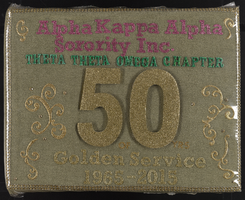
Alpha Kappa Alpha Sorority, Theta Theta Omega Chapter scrapbook: "50 years of golden service"
Date
Archival Collection
Description
From the Alpha Kappa Alpha Sorority, Incorporated, Theta Theta Omega Chapter Records (MS-01014).
Mixed Content
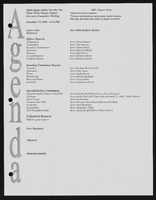
Alpha Kappa Alpha Sorority, Theta Theta Omega Chapter executive committee agendas
Date
Archival Collection
Description
From the Alpha Kappa Alpha Sorority, Incorporated, Theta Theta Omega Chapter Records (MS-01014) -- Chapter records file.
Text

Wayne Tanaka oral history interview: transcript
Date
Archival Collection
Description
Oral history interview with Wayne Tanaka conducted by Ayrton Yamaguchi, Vanessa Concepcion, Kristel Peralta, Cecilia Winchell, and Stefani Evans on March 12, 2021 for Reflections: The Las Vegas Asian American and Pacific Islander Oral History Project. Wayne shares his family's heritage and history as Japanese Hawaiians and discusses his father's internment during World War II. He shares his background growing up in Lahaina, Maui, Hawai'i and how he came to live in Las Vegas. Wayne discusses his career as an educator for the Clark County School District and talks about his life in Las Vegas with his wife and daughters. Subjects discussed include: Las Vegas Buddhist Sangha; Executive Order 9066; Sunset High School; Boulder Dam Area Council.
Text

Dr. Alvaro Vergara-Mery oral history interview: transcript
Date
Archival Collection
Description
Oral history interview with Dr. Alvaro Vergara-Mery conducted by Barbara Tabach on October 28, 2020 for the Latinx Voices of Southern Nevada Oral History Project. Alvaro discusses his personal history and his upbringing in both Chile and the United Kingdom before immigrating to the United States; due to political unrest in Chile, he moved to the U.K. where his mother was born before attending university in the United States. Alvaro talks about his work as a medical interpreter for University Medical Center (UMC) as well as his college teaching experience at University of Nevada Las Vegas and California State Berkley.
Text
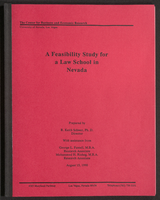
A Feasibility Study for a Law School in Nevada (bound)
Date
Archival Collection
Description
A bound version of "A Feasibility Study for a Law School in Nevada" prepared by R. Keith Schwer, Ph. D., Director, with assistance from George L. Fussell, M.B.A., Research Associate, and Mohammed H. Risheg, M.B.A., Research Associate, The Center for Business and Economic Research, University of Nevada, Las Vegas. From the University of Nevada, Las Vegas William S. Boyd School of Law Records (UA-00048).
Text

Catherine Cortez Masto oral history interview: transcript
Date
Archival Collection
Description
Oral history interview with Catherine Cortez Masto conducted by Claytee D. White on August 10, 2018 for the Latinx Voices of Southern Nevada Oral History Project. Catherine Cortez Masto grew up in Las Vegas near where the town ended and the desert began, which at that time was near Decatur and Pennwood. She grew up playing in the streets and riding horses and motor bikes with girlfriends and cousins. Her father, Manny Cortez, began as a valet at the Dunes before entering politics. He served 16 years on the County Commission and then 13 years as the chief of the Las Vegas Convention and Visitors Authority. As the head of the LVCVA, Manny oversaw campaigns to increase tourism, enlarge McCarran International Airport, improve taxicab service, and served as a visionary for the entire region. Catherine followed in her father's footsteps while being her own woman and making her own mark on the region. She attended college at UNR and law school at Gonzaga University School of Law. After a clerkship, she worked for a small local Las Vegas firm for 4 - 5 years, then moved to the governor's and then served two terms as Nevada's Attorney General. Currently she's in the US Senate with committee assignments that include Banking, Housing and Urban Affairs; Energy and Natural Resources; Commerce, Science, and Transportation; Rules and Administration; Indian Affairs, and the Committee on Aging. Subjects discussed include: Dunes, Manny Cortez, County Commission, LVCVA, Judge Carl Christensen, Judge Mendoza, Taxi Authority, Tourism, and Mike O'Callaghan.
Text

Alpha Kappa Alpha Sorority, Theta Theta Omega Chapter scrapbook: "Moving through the 21st century"
Date
Archival Collection
Description
From the Alpha Kappa Alpha Sorority, Incorporated, Theta Theta Omega Chapter Records (MS-01014).
Mixed Content

